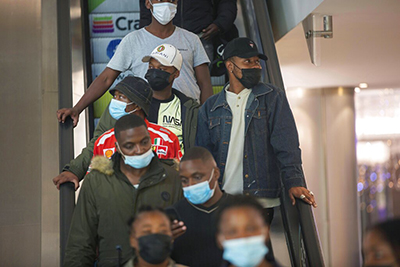
A new COVID-19 variant is here, according to the World Health Organization (WHO), who made the statement on Friday, November 26.
Authorities are worried that a new variant of COVID-19, “omicron,” could possibly be even more contagious than the Delta variant and more resilient to vaccinations.
The new COVID strain was named by the World Health Organization. It was first reported this week in South Africa and has started surfacing in other countries.
Starting Monday (Nov. 29), the United States is banning travel by non-U.S. citizens from South Africa and seven other African nations.
“I think it really is a big deal,” said Dr. Matthew Sims, the director of infectious disease research at Beaumont. “Concern No. 1 is that it’s going to be even more contagious than Delta. Concern No. 2 is that the vaccine and the antibodies may not work as well.”
WHO classified the new variant, B.1.1.529, as a Variant of Concern and has named it
Omicron. No cases of this variant have been identified in the U.S. to date. CDC is following the details of this new variant, first reported to the WHO by South Africa. We are grateful to the South African government and its scientists who have openly communicated with the global scientific community and continue to share information about this variant with the U.S. Department of Health and Human Services and CDC. We are working with other U.S. and global public health and industry partners to learn more about this variant, as we continue to monitor its path.
CDC is continuously monitoring variants and the U.S. variant surveillance system has reliably detected new variants in this country. We expect Omicron to be identified quickly, if it emerges in the U.S.
“We know what it takes to prevent the spread of COVID-19. CDC recommends people follow prevention strategies such as wearing a mask in public indoor settings in areas of substantial or high community transmission, washing your hands frequently, and physically distancing from others,” according to a press release statement. “CDC also recommends that everyone 5 years and older protect themselves from COVID-19 by getting fully vaccinated. CDC encourages a COVID-19 vaccine booster dose for those who are eligible.”
Starting today, Monday, November 29, the United States will ban travel by non-U.S. citizens from South Africa and seven other African nations, according to WDIV.
“I think it really is a big deal,” said Dr. Matthew Sims, the director of infectious disease research at Beaumont in the article. “Concern No. 1 is that it’s going to be even more contagious than delta. Concern No. 2 is that the vaccine and the antibodies may not work as well.”
Omicron is thought to be the strongest COVID variant yet, according to the article.
Pfizer officials said if necessary, they can adapt their vaccine within six weeks.
“If this new variant has to have a new vaccine, people are going to need to get that vaccine,” Sims said. “I will tell you I’ll be first in line. My wife will be next to me, and my kids will be right behind me.”
Dr. Anthony Fauci agreed.
“This will be highly transmissible and might in fact escape some of the immune parameters, such as monoclonal antibodies and convalescent serum and plasma when people recover, and likely even some protection from the antibodies that are induced by vaccination,” Fauci said. “So we’re taking it very, very seriously.”


Be the first to comment